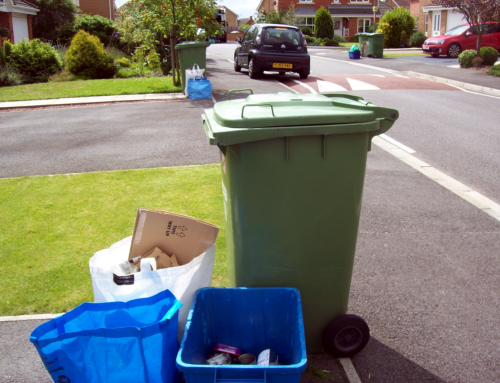by Sam Taylor
7 minute readA clear sign of how big a problem criminal activity in the waste sector is now perceived as being is that the Government dedicated an entire chapter in its waste and resources strategy for England to the issue. While the waste and resources sector has known for a long time that both its environmental efforts and economic performance have been undermined by waste crime, it took a couple of Eunomia reports commissioned by the Environmental Services Association (ESA) to make clear the scale of the problem and grab the attention of policy makers.
Most recently, in 2017’s Rethinking Waste Crime, Eunomia found that illegal activity in England costs legitimate operators and the tax payer around £600 million a year. The Government is now giving waste crime rather more attention, alongside welcome proposals to greatly improve waste management. However, it is not clear that it has recognised the extent of the new opportunities for waste criminals that the new waste strategy offers, or that it is prepared to address them so that they don’t undermine England’s new policy ambitions.
Negative reports
Since Eunomia’s first report for the ESA, Waste Crime: Tackling Britain’s Dirty Secret, was published in 2014 there has been much talk about criminal activity in the waste sector, including high profile stories in the national media. In 2016, Sir James Bevan, the chief executive of the Environment Agency (EA), went so far as to liken the systemic lack of awareness regarding waste crime to the failure to come to terms with the drug problem in the 1980s. Waste crime was, he said, “the new narcotics”.
Rethinking Waste Crime sought to devise a package of changes to modernise the regulatory system for waste management. It was followed by an Independent review into serious and organised crime in the waste sector, chaired by Non-Executive Director at Defra Lizzie Noel with support from Colin Church, the outgoing Chief Executive Officer of the Chartered Institution of Wastes Management (CIWM), and high ranking members of the police force. This review echoed many of the recommendations made in Rethinking Waste Crime, including a call to improve the kind of cross-regulatory co-operation the review itself instantiated – and that we see in the partnership between the ESA and EA on waste crime.
There appears to be a broad consensus across the waste and resources sector on the real and immediate need to tackle waste crime. In an often-fractious industry, concerted action against waste crime stands out as one of the few things that pretty much everyone agrees about. So, policy makers are hearing the same messages from all sides: that the need for action is urgent. The inclusion of a dedicated chapter in the waste strategy, which includes many of the recommendations from Eunomia’s report and the independent review is proof that they are listening.
Tax take
Criminal activity in the waste sector has been spawned by a growing mismatch between the robustness of the regulatory system and the impacts of the policy goals the waste sector has been tasked with meeting.
From the early 2000s, the main driver was an escalating EU target for the diversion of Biodegradable Municipal Waste (BMW) from landfill; subsequently, the 2020 recycling targets set by the waste framework directive came to the fore.
Throughout the 2000s, Landfill Tax (LFT) was the main instrument intended to discourage the disposal of waste to landfill and drive waste away from the bottom of the waste hierarchy. It began in 1996 at £7 per tonne, as a way of internalising the costs of landfill, so that what had previously been environmental externalities became costs to waste producing businesses and households.
Subsequently, though, an escalator was put in place to predictably increase the LFT rate year on year. The expectation was that this would lead to better waste management as non-taxed options such as recycling became increasingly financially attractive. Certainly, landfill is no longer the most affordable option for waste management in the UK. However, making waste disposal expensive has also created an opportunity for illegal operators: those prepared to evade LFT could marginally undercut legitimate operators and pocket the money that should have been paid to the Treasury. Receiving a single truck load of 15 tonnes could net as much as £2,000.

Registered waste canine: Eunomia was able to register Oscar the dog as a waste carrier, demonstrating the weakness of regulation in this area. Photo © Mike Brown.
While the waste industry has used the last twenty years to adapt, the regulatory system has not kept pace as the incentive to cheat the system has increased. That now happens on a huge scale: waste crime costs England £600 million a year. As we now look towards the next step change in aspirations regarding improving waste management, the danger is that we will repeat this omission.
In production
The changes in prospect are major, including:
- a revamp of England’s producer responsibility system for packaging; and
- the introduction of a deposit refund scheme (DRS) for drinks packaging.
Under the current producer responsibility system, producers pay around 10% of the costs of managing the packaging waste generated from the products they place on the market. Much of the cost of dealing with household waste falls on local authorities.
Even with this quite small cost burden for producers, we already see significant failures in the system. The new proposal will shift the full costs onto producers, creating far greater opportunity for criminality.
It’s not that producers will generally set out to break the law; rather, the large amounts of money producers will need to transfer to operators to manage waste on their behalf will be an enticing prospect for criminals.
Verification of what happens to waste is fundamental to a properly functioning and crime-proof waste management system. Under the proposed new system, it will be all the more critical that producers need know that their extended producer responsibility (EPR) obligations are being fulfilled through legal routes – that what the people collecting their waste say is happening to it is actually happening to it.
Similarly, for a DRS, verification is essential to ensuring that criminals are not able to cheat the system. Like the LFT, a DRS will add value to waste material, which criminals will seek methods to exploit.
Policy wonky
If our policy aim is that an extensive EPR system and a DRS ensures the high capture of packaging material for recycling, we need a robust regulatory system. The new economics will incentivise criminal operators to prey upon producers, and we need to ensure that producers’ contributions go towards making things better, not worse.
The Government has committed to consulting on its proposed measures for tackling criminality in the waste sector later this year. New approaches to regulation are, of course, welcome and necessary. However, holding this consultation after the initial consultations on the proposals regarding EPR and DRS have been completed is the policy planning equivalent of putting in foundations once your house is already half built. Regulating EPR and verifying the end destinations of the materials collected has to be front and centre of the policy approach, or the UK’s recycling ambitions may be frustrated.
Perhaps it’s somewhat academic at this stage – but if a properly robust regulatory system had been in place in the past to guard against waste crime, there may have been less need for a dramatic step change in policy aspirations. However, it remains a matter of great practical importance that the Government recognises and acts on the need to support policy through effective regulation. If the two do not proceed hand in hand, the new policies risk being impotent to effect change.
The new EPR system and DRS are set for introduction in 2022–23, and there is still time to make the regulatory changes needed to ensure their success. For the immediate future, I am resting my hopes on the waste crime consultation, and the prospect that it will engage positively with the policy recommendations made in Rethinking Waste Crime. If industry and Government can maintain a spirit of co-operation and agreement in tackling criminal activity, then we may still be able to prevent criminals from robbing us of our environmental ambitions.
Featured image: Marco Verch (CC BY 2.0), via Flickr.







Leave A Comment